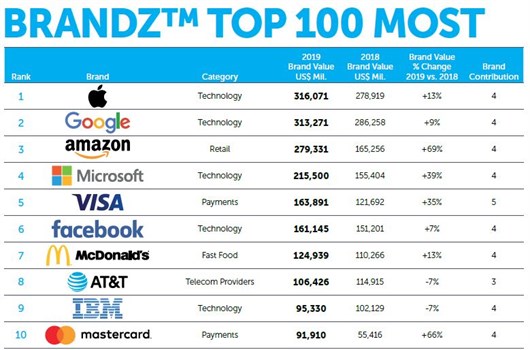Brands that are perceived as innovative and that also provide a great experience – meeting consumers’ needs where and when they are wanted – grew the most in value in the latest BrandZ™ Top 100 Most Valuable US Brands ranking, announced today by WPP and Kantar.
The ground-breaking BrandZ study ranks the most valuable US brands, analyses their strengths, and identifies the key forces driving growth in this dynamic and complex market. It is the second edition of an annual report that tracks and anticipates the evolving environment for brands in the US and charts their changing fortunes.
According to the report, customer experience is as important as being perceived as innovative for increasing brand value. As Americans engage with brands in more and more places, the brands that continually innovate customer experience are winning, growing 200% more than those that don’t.
The new number one, Apple, increased its brand value by 13% in the last year to $316.1 billion to become the most valuable US brand. Its continued innovation across an entire ecosystem of services – such as Apple Pay, iCloud and Siri - that wrap around its key devices including the new Apple Watch and iPhone X, ensures that Apple increasingly owns and transforms the user experience in a way that is very meaningful to consumers.

Netflix grew its value more than any other brand, increasing by 93% over the last year to $30.2 billion. Benefiting from the growing adoption of streaming entertainment worldwide, the streaming superpower has capitalized on personalizing its service with original and entertaining content and has grown its subscriber base to 137 million, propelling it to no.28 in the ranking and the second most valuable entertainment brand behind Disney. Other fastest risers are PayPal (up 88%, no.19) and Amazon (up 69%, no.3).
Uber, the most valuable newcomer to the ranking (in at no.35, $21.1 billion), provides the best brand experience, according to US consumers, scoring above Amazon and Apple. It was also one of the most innovative brands in the ranking, ahead of Amazon and Tesla.
“Innovative companies such as Netflix and Uber are disrupting markets and creating new ones, while larger brands like Apple continue to shake things up with data, digital and marketing technology investments to maintain leadership in the new era of consumer experience. This year’s ranking shows that while US brands are amongst the most innovative in the world, innovation alone is no longer enough for brands to grow,” said Tim Wragg, CEO Kantar North America's Insights Division.
Beth Ann Kaminkow, CEO of Kantar Consulting Brand & Marketing Americas continued: “Customer experience is now the greatest amplifier of value growth. However, US brands are lagging other countries in delivering on consumers’ expectations and letting them experience their innovation. They will need to focus on improving consumers’ experience of their brand in 2019 by breaking down internal silos and uniting marketing and sales to design holistically across all channels and touchpoints, for experience and commerce.”
Overall, the BrandZ Top 100 US brands grew 15% in the last year to $3.65 trillion, a combined value that is nearly one fifth (19.6%) of US GDP. They generate more value for their businesses than brands in any other country in the world.
“US brands excel at globalization,” said WPP’s David Roth. “The fact that they are so entwined in the lives of consumers around the world means they are often not thought of as American. This has helped to disconnect them from the political turmoil in the last year. It is an advantage not shared by brands that are less global and more connected to their country’s DNA. Their independence from the US is further demonstrated by the fact that they account for roughly half the value of the BrandZ Global Top 100 ranking.”
Other trends highlighted in this year’s BrandZ Top 100 Most Valuable US Brands report and ranking are:
Polarization of value and premium. Brand growth mirrors the US economy with more brands focused on providing value and premium offers. Value retailer Walmart and membership retailer Costco grew by 11% to $30.7 billion and 19% to $19.9 billion respectively, while Apple further cemented its luxury brand credentials with the launch of the iPhone X. The multinational tech company’s most expensive phone proves that innovation and services can justify a price premium.
Meaningfully different brands grew 78% more in the last year. A key driver of brand value growth US brands are among the most different in the world (only behind Indonesia’s top brands). The fastest risers – Netflix, Paypal, Amazon and Instagram – are all powered by their difference as are newcomers to the ranking such as Uber and HBO.
Newcomers drive big value growth in the ranking. 11 newcomers joined the ranking this year. Their average value is $10.58 billion, 77% higher than the average for brands that dropped out of the Top 100, indicating the high entry brand value threshold of innovative and disruptive newcomers to the ranking. Uber was the most valuable newcomer (no.35, $21.1 billion) followed by Dell Technologies (no.45) and Xbox (no.51).
Strong brands beat the stock market. The BrandZ US Strong Brands Portfolio increased 19.8% between November 2017 and August 2018, compared with 12.6% for the S&P500. This means they created 1.57 times as much value for shareholders.
B2B brands: All B2B brands in the BrandZ US Top 100 notched up huge gains in brand value this year: Accenture (+30%), Adobe (+66%) Salesforce (+44%) and Oracle (+18%). As consumer expectations soar that may soon translate to higher expectations in the business world too.
Brands with purpose. More and more consumers are rewarding brands not merely for making great products but sharing their values. Nike’s promotion of controversial celebrities known for taking a stand, such as Serena Williams and quarterback Colin Kaepernick, has helped reinforce consumers’ strong emotional connection with Nike. This year, the brand gained 37% in value and moved up the ranking to no.18.

